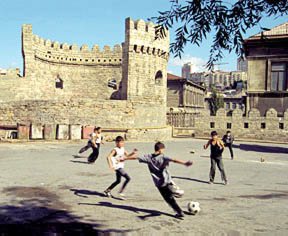|

Winter
1998 (6.4)
Pages
14-16
Baku Diary
Unexpected
Gifts
by
Jonelle Glosch
  It's that time again-the
season of gift giving. For me, it brings back memories of when
I moved to Azerbaijan three years ago ready to get involved,
to give something of myself to help build a future, especially
for the youth of this country. In the process, I think just living
here has turned into the one of the greatest experiences of my
life. Azerbaijanis have given me a greater gift than I could
ever hope to give them. It's that time again-the
season of gift giving. For me, it brings back memories of when
I moved to Azerbaijan three years ago ready to get involved,
to give something of myself to help build a future, especially
for the youth of this country. In the process, I think just living
here has turned into the one of the greatest experiences of my
life. Azerbaijanis have given me a greater gift than I could
ever hope to give them.
Photo:
Everyday
scenes inside the fortress walls of Baku's "Inner City"
(Ichari Shahar).
Gift of Openness
I am
continually amazed that people who have so little themselves
have such an enormous capacity to give so much. Recently, I found
myself in an emergency. My landlady, it turns out, had sold my
apartment out from under me. It was a misunderstanding, of course.
But that didn't solve the problem. I needed help. In America,
where self-reliance is a virtue and asking for help is tantamount
to admitting failure, I probably would have kept my problem to
myself. But here everyone knows that you can't survive on your
own. We need each other-or as the saying goes, "We're all
in this soup together, so let's make the best of it." And
sure enough, people did reach out to me, helped me find shelter
and even offered me money until I got myself reorganized. Such
is the bond that exists here. I'm learning to admit my needs
and my inadequacies and, in turn, have experienced the power
and safety inherent in the great bonds of friendship.
  Gift of Improvisation Gift of Improvisation
There
are so many hardships to deal with here on a daily basis. I always
marvel about how unfazed Azerbaijanis are when confronted with
such obstacles day after day. Last weekend, for example, we were
without electricity in our apartment for 17 long hours. Usually
when the electricity goes off, it's due to malfunctioning, worn-out
equipment.
Left:
The Government
House where the Ministry offices are located. The building was
constructed by the labor of German prisoners.
Generally, you
can count on the problem being fixed in five or six hours-more
or less, maybe. But last weekend, the power was out for what
seemed an eternity. The night was so cold without heat and I
couldn't bear the thought of having to wash in ice cold water.
In addition, the freezer compartment of the refrigerator kindly
obliged and defrosted itself throughout the night, a welcome
gesture at any other time, but it just so happened that I had
bought some chicken breasts and was hoping to save them for a
special occasion.
Oh, well, as
they say, "when life hands you lemons, make lemonade."
But when life hands you defrosted chicken, does that mean you're
supposed to make fajitas? One of my neighbors had just been given
some shrimp brought in from Dubai, so there she was at 3 o'clock
in the morning having a shrimp fry. The ability to be flexible
and improvise is another gift I'm learning to treasure.
Gift of Determination
Sometimes at the public school where I volunteer once a week,
it's so cold that we all sit there in class with our coats and
gloves on. I can't help but admire the determination of these
kids who don't have to attend these classes. They come simply
because they want to learn English. They're eager to connect
with others and explore a big world. They find life so interesting-in
spite of the cold, and that's what makes their hearts warm enough
for all of us.
What I like about Public School No. 41 is the openness of the
kids. When I arrive, I walk across the yard and they recognize
me immediately as the "inastranka"-the foreign lady.
The little ones always run towards me-though not quite daring
to approach me-just coming close enough to get a good look, sometimes
hiding behind a tree or an older, taller child. And then I'll
hear them say, "Hello, have are you?" (I guess that's
what "how are you" sounds like to them!) They are so
shy. I try to engage the little ones but they run away. However,
it doesn't take long before a small crowd gathers around proudly
repeating the few phrases they know in English.
Gift of Cultural
Diversity
I was
shy like that, too, when I first came to Azerbaijan. I didn't
want to make mistakes or appear uncultured. Education is so highly
prized here. It didn't take me long to realize that many can
recite lengthy selections from poetry including the world's greatest
literature. They know the likes of Shakespeare, Tolstoy, Hemingway
and many others including their own poetic geniuses such as Nizami
and Samad Vurgun. On several occasions, I've been asked why Americans
don't know Theodore Dreiser, "one of the great novelists"
as they call him. The fact that he was also a Socialist at a
time when such an identity was highly suspect in America explains
why most Americans aren't familiar with his works-but that hardly
justifies it all.
In Azerbaijan, knowing more than one language is considered fundamental
to a good education. Many Azerbaijanis speak Azeri and Russian
plus English and an additional "foreign" language such
as French or German. In addition, they can usually communicate
well with people who speak Turkish due to its similarity to Azeri.
We have a joke in my English classes. They love to hear me tell
it over and over again. The fact that I first read it in an American
magazine makes it even funnier to them. The joke goes like this:
"What do
you call a person who speaks three languages?" The answer:
"Tri-lingual."
"Well then, what do you call a person who speaks two languages?"
"Bi-lingual" obviously.
"And what do you call a person who can manage to speak only
one language?" "An American!"
Azerbaijanis, on the other hand, consider themselves uneducated
if they don't know several languages. Many families sacrifice
hard-earned salaries to hire private language tutors for their
children. This openness to other languages and other points of
view is a joy to behold-a gift, indeed.
They still hold out hope for me, though probably not much, that
someday I will master the intricacies of their language. They
tease me, saying, "You expect us to learn English from you,
so you should learn Azeri from us!" Fair enough. "Buyurun"
(if you please).
Gift of Acceptance
When
it comes to national dances, my friends encouraged me to learn
and I soon discovered that it was something that I love dearly
and feel fairly comfortable about in this new culture. Azeri
dances are so much easier to learn than the Azeri language. On
many occasions, I've joined a large group of people-young and
old-clapping rhythmically as one person after another moves into
the center ring, "the spotlight," to dance alone.
These traditional dances are so graceful and at the same time,
even seductive, full of eye contact and smiles, beautiful fluid
hand movements combined with quick footwork around the floor.
They can be joyful, flirtatious, soulful and exhausting-the music
just keeps playing as long as the dancers are willing.
At a recent wedding the father of the bride invited me to dance
with him, and we were out in the middle of the floor a full 10
minutes before I realized no one else had any intention of joining
us. Nor was the music ever going to end! There I was in the middle
of the dance floor making a spectacle of myself. The Azerbaijanis
seemed proud that a foreigner was enjoying their culture. They
took it as a gift to themselves that I was enjoying their dancing
so much.
To me, the greatest gift has been their willingness to embrace
me as a foreigner and love me these past three years. In Azerbaijan,
it seems the season of giving is not confined to a few days at
the end of the year. Giving of oneself is quite in vogue all
year round. And it's this generosity that has made an immense
difference in my life.
Jonelle Glosch
is the founder of Azerbaijan Business Services which since its
establishment in 1997 has trained more than 250 students in English
and modern office skills.
From Azerbaijan International (6.4) Winter 1998.
© Azerbaijan International 1998. All rights reserved.
Back to Index
AI 6.4 (Winter 1998)
AI Home
| Magazine
Choice | Topics
| Store
| Contact
us
|


